 Petzlover
Petzlover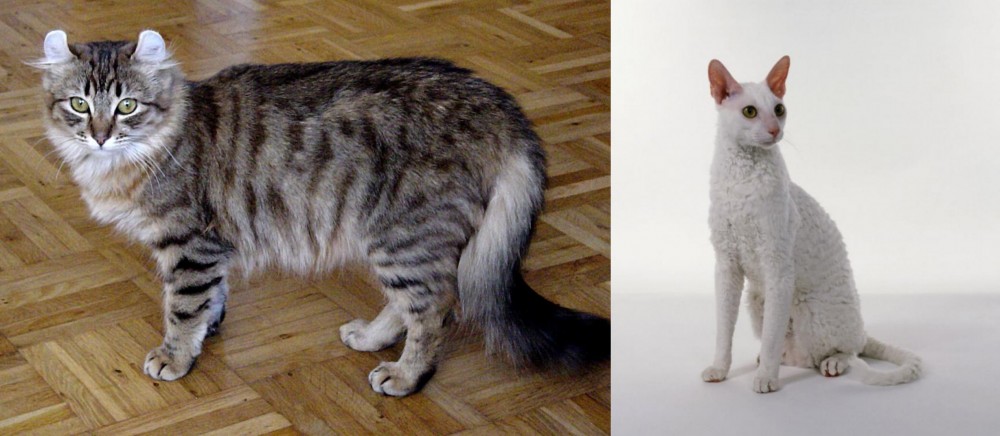 American Curl is originated from United States but Cornish Rex is originated from United Kingdom. Both American Curl and Cornish Rex are of same weight. American Curl may live 5 years less than Cornish Rex. Both American Curl and Cornish Rex has same litter size. American Curl requires Moderate Maintenance. But Cornish Rex requires Low Maintenance
American Curl is originated from United States but Cornish Rex is originated from United Kingdom. Both American Curl and Cornish Rex are of same weight. American Curl may live 5 years less than Cornish Rex. Both American Curl and Cornish Rex has same litter size. American Curl requires Moderate Maintenance. But Cornish Rex requires Low Maintenance
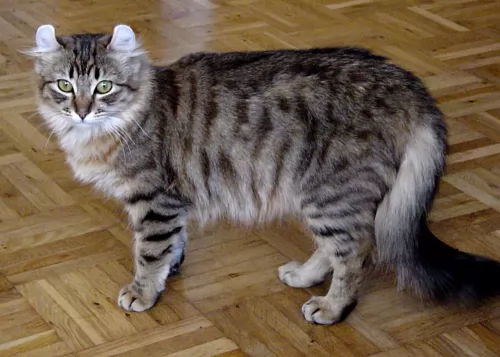 The American Curl is well known for its unusual shaped ears and for being one of the youngest cat breeds.
The American Curl is well known for its unusual shaped ears and for being one of the youngest cat breeds.
It developed in California. The first of these cats appeared to have been strays that arrived in California in 1981. The black female’s name was Shulamith, and she gave birth to a litter with the same curled ears, and was the ancestor of the American Curls of today.
Appearing in a cat show in 1992 for the first time, the longhaired American Curl was then given championship status by TICA and it was also admitted to the Cat Fanciers Association’s championship class in the long- and shorthaired divisions.
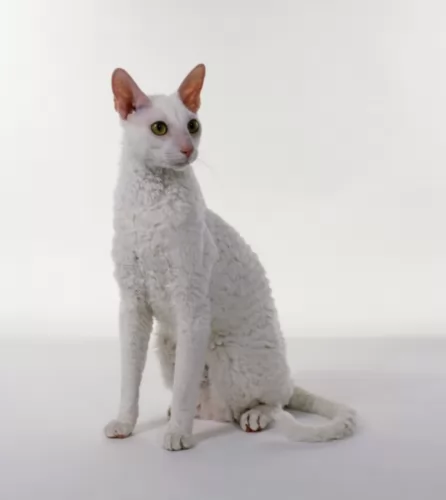 Cornwall is the birthplace of the unusual Cornish Rex cat – a curly-coated cat.
Cornwall is the birthplace of the unusual Cornish Rex cat – a curly-coated cat.
A kitten was born in 1950 and belonged to Nina Ennismore and Winifred Macalister. The other kittens had short hair but this unusual kitten had curly hair, the result of a spontaneous natural mutation.
A successful breeding program was started and it was in 1963 that the American Cat Fanciers Association as well as the and today it is recognized by all cat registries.
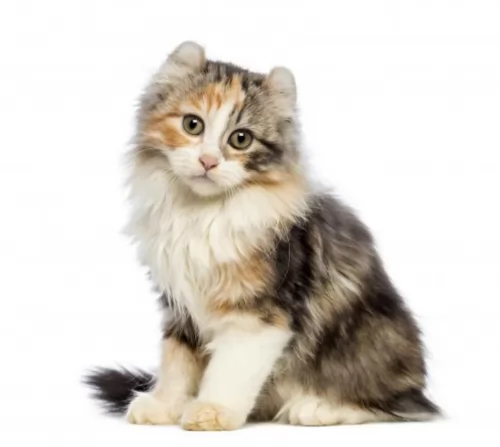 The American Curl is a medium-sized cat weighing roughly 2.3–4.5kg. Its a cat that stands between 21 and 27cm in height.
The American Curl is a medium-sized cat weighing roughly 2.3–4.5kg. Its a cat that stands between 21 and 27cm in height.
It’s also a cat that takes a fairly long time to mature, reaching maturity about 2 or 3 years of age. The most distinctive feature of this cat is its unusual ears that curl backward as opposed to standing up like most other cats. At birth the ears are straight but they gradually start curling back, staying in a tight bud position.
The American Curl's coat is soft and silky and doesn’t require too much grooming. The fur comes in colors such as grey, white, apricot, black, and the coat can be a solid color or in a host of different patterns such as bi-color, triple-color, tabby, ticking and others.
The head is round, the eyes of the cat are large, giving the cat an alert, friendly look. The eyes can be many different colors from blue to green, amber, copper, hazel, and yellow.
The American Curl Cat loves his human family and gets on well with children too. He is an adaptable cat, settling into different lifestyles. You’ve got to watch him around small children who might manhandle him and pull his sensitive ears.
Nonetheless, he is sociable and loving. He is an intelligent cat, being active and alert and will even follow you around to see what you’re doing that he can be involved in too. He isn’t a particularly talkative breed but he loves to play and can even learn to fetch a smallish ball.
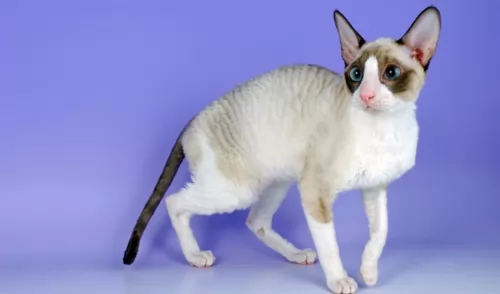 The Cornish Rex is a small to medium-sized cat weighing between 3 to 5kg. It’s a lithe, slender cat with a small, narrow head with big ears and eyes.
The Cornish Rex is a small to medium-sized cat weighing between 3 to 5kg. It’s a lithe, slender cat with a small, narrow head with big ears and eyes.
The cat has long, slender legs with a tail that is also slender and long. The hair is very fine and they are actually prone to hair loss. The coat has fine, short, silky hair. There can be a bit of a curl in the hair, The coat comes in many colors from white, silver, black, red, blue to chocolate and they can have different patterns too as well as bein bi-color.
The eyes can be gold, brown, or green. The torso is long and lean, the cat has a deep chest but strong hips and rear end that allow the Cornish Rex to leap with ease up onto perches.
The Cornish Rex loves his human family and loves spending time with them, whether that means fun and games or sitting in your lap.
He is intelligent and can learn a few tricks and is capable of learning to walk on a leash. He is a confident cat, playful and entertaining. Gentle and loving, he is a talkative cat, wanting to express his opinion about everything.
He will fit easily into different lifestyles, whether you’re single, a family, or in a retirement home, so long as he is receiving lots of attention.
He isn’t as frail as he looks and can get pretty active and social with children and dogs and may even beat the dog to fetching a small ball.
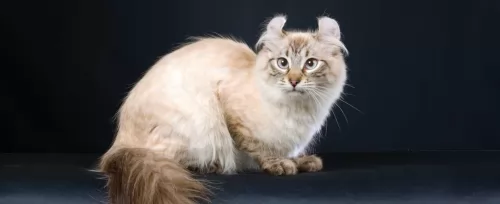 You’ll find your American Curl to be a friendly, loving cat that will easily bond with his human family. They’re adaptable cats and will happily adjust to your lifestyle.
You’ll find your American Curl to be a friendly, loving cat that will easily bond with his human family. They’re adaptable cats and will happily adjust to your lifestyle.
Despite their affection, however, American Curls aren't the type of cats to want to be pampered and petted - they are quite happy just to sit next to their owner and relax, or play with their toys.
Because American Curls are highly adaptable, they're suitable for a number of different home types, and homes with other pets or children, making you a splendid feline pet and companion.
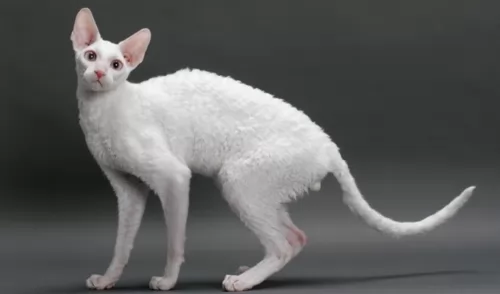 If you’re looking for a cat that can bring laughter and fun into the household, you won’t go wrong with a Cornish Rex as they will amuse and delight.
If you’re looking for a cat that can bring laughter and fun into the household, you won’t go wrong with a Cornish Rex as they will amuse and delight.
He is also a cat that doesn’t require a lot of fuss and bother, although he makes a fuss about the amount of attention he gets.
He doesn’t like being left alone for long, so a good idea is to work from home or to get a companion for him. Other than than, he makes the most splendid feline companion.
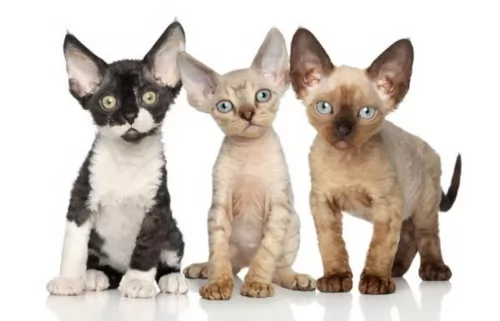 The Cornish Rex is a hardy cat with very few health issues. Certainly, because of the very fine hair, you’d have to be aware of sunburn.
The Cornish Rex is a hardy cat with very few health issues. Certainly, because of the very fine hair, you’d have to be aware of sunburn.
Cats can get sunburned and can be at serious risk of getting skin cancer later on. Be sun-smart and apply pet sunscreen.
Be careful of the type of sunscreen you use as your cat will likely want to lick it off. Other issues to look out for are hypertrophic cardiomyopathy. This is a common kind of heart disease in cats where there is a thickening in the wall of the heart.
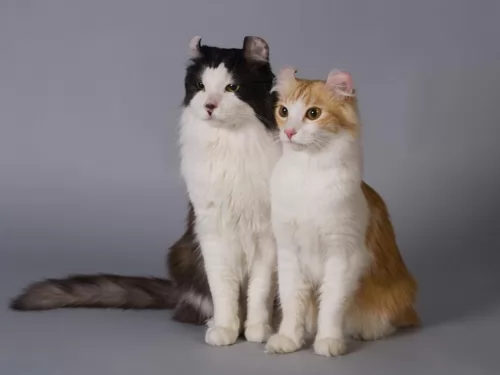 The Curl’s coat can be either short or long, but with a gentle brushing, the coat can be well maintained. The shorthaired variety sheds a bit more during the year than the longhaired variety and this is why grooming and brushing becomes necessary.
The Curl’s coat can be either short or long, but with a gentle brushing, the coat can be well maintained. The shorthaired variety sheds a bit more during the year than the longhaired variety and this is why grooming and brushing becomes necessary.
You can brush your cat’s teeth to avoid periodontal disease.
Trim your cat’s nails every other week if they don’t wear down naturally.
Check inside- and outside the cat’s ears for parasites and dirt. The cat’s ears have a unique shape and they may well be born with narrowed ear canals that can trap dirt and wax and this results in ear infections.
Like all cats breeds, your lean, muscular American Curl can be susceptible to obesity and heart disease. Speak to your vet about a special cat food for your feline friend as cat food is specially formulated to deliver the exact level of natural vitamins, minerals, fiber and antioxidants needed. Understand the amount of food your Curl requires by checking out the feeding instructions on the food labels. Always talk to your vet if you're not sure how much and what you should feed your cat.
Remember, that if you don’t want to do these grooming routines for your cat for fear of hurting him or not doing it properly, the vet or your local pet groomer will do it for you.
Make sure to provide your intelligent American Curl with toys and exercise. You can buy toys and games that will challenge his mental and physical abilities.
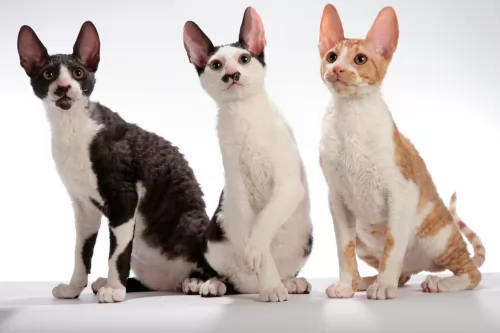 Grooming your Cornish Rex isn’t going to be an issue as the cat has very little hair. Although nothing is set in stone and some Cornish Rex’s have thicker coats, requiring more brushing. Maybe a soft brush once a week will be sufficient for this cat breed.
Grooming your Cornish Rex isn’t going to be an issue as the cat has very little hair. Although nothing is set in stone and some Cornish Rex’s have thicker coats, requiring more brushing. Maybe a soft brush once a week will be sufficient for this cat breed.
A good idea is to take a cloth of warm water and to gently wipe your cat so that he is free of dust.
Supply a litter box and make sure that you remove his droppings every single day.
Have your pet neutered or spayed if you don’t want unwanted kittens. These minor ops have many health benefits for your cat as well.
When you brush your cat, check his entire body out for any abnormalities. Check for new lumps, check inside the ears to make sure they are clean and free of redness which could indicate an infection.
Clip his toenails, make sure his eyes are clear and bright, free of discharge, and check inside his mouth to make sure there aren’t any bad teeth, as this could cause him a lot of discomfort.